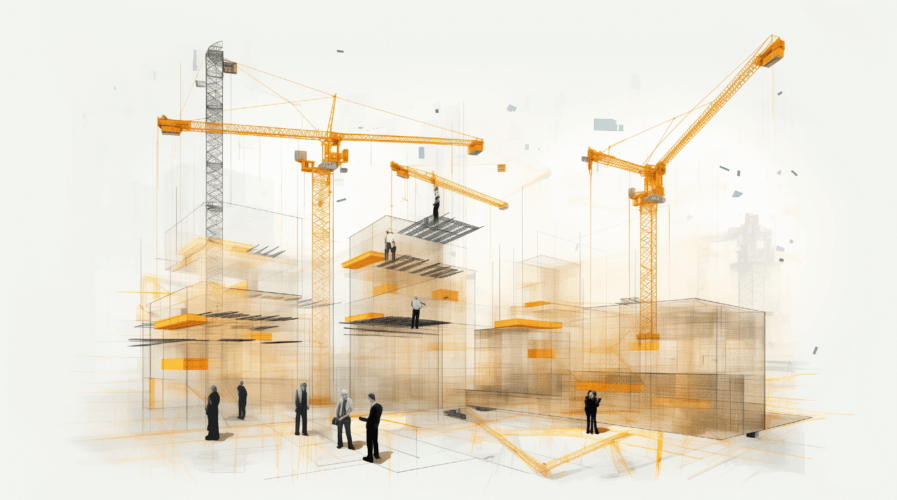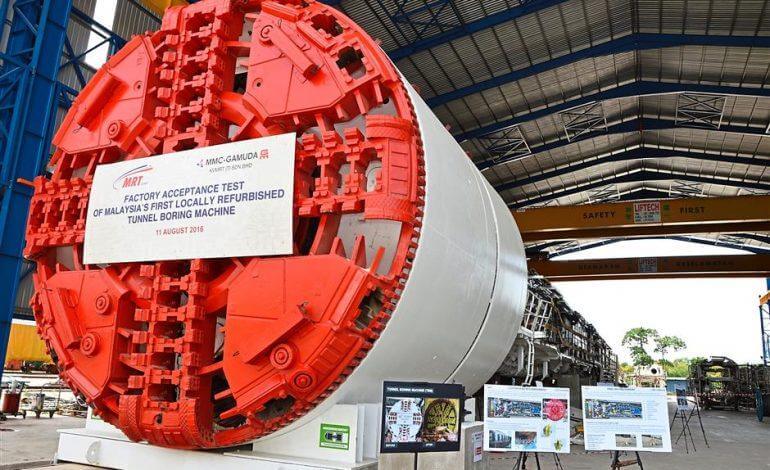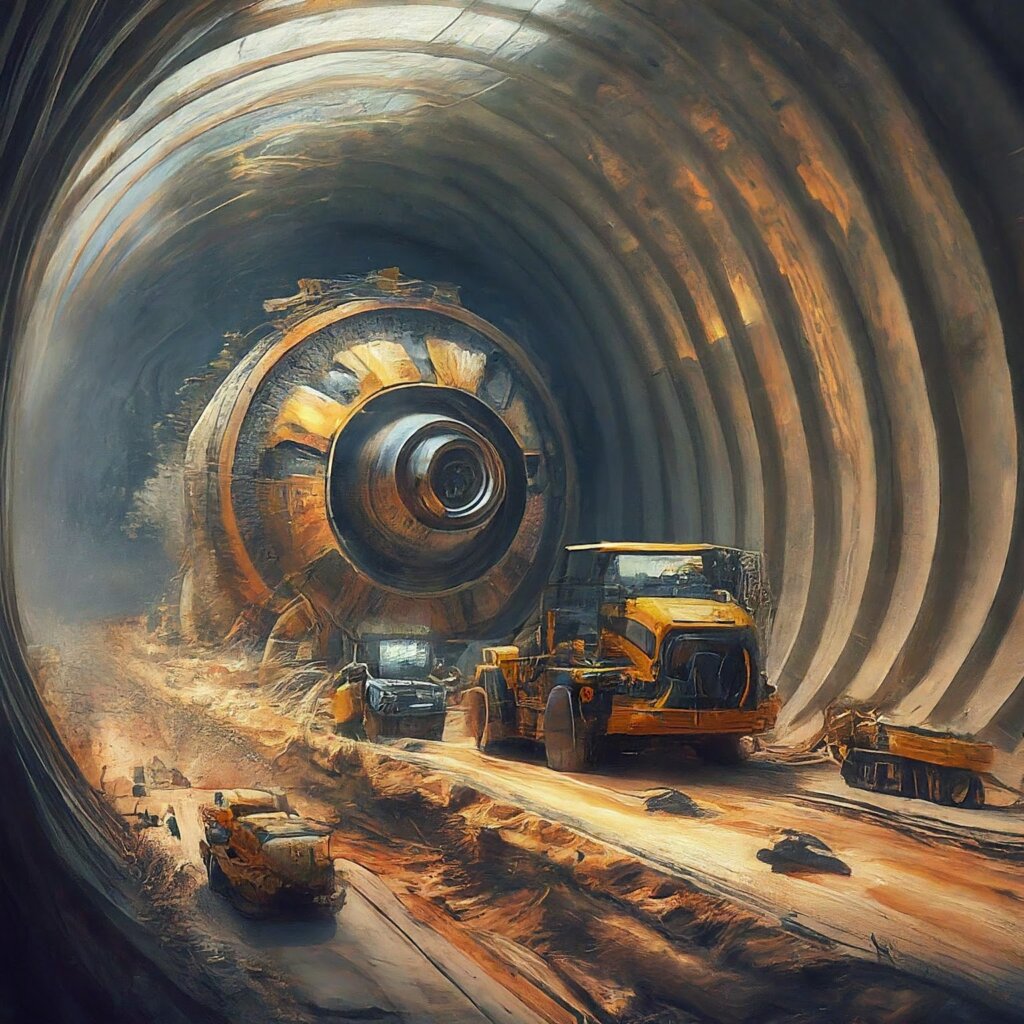
Image of Construction Site Created by Imagen
AI in Construction and Engineering: Building the Future
- AI is making a difference in construction and engineering
- In Malaysia, Gamuda is working with Google for AI in tunneling
The transformative role of AI in shaping the future of the built world is unfolding rapidly. From construction sites to engineering design, AI technologies are revolutionizing the way we build, optimize, and manage infrastructure.
In construction, AI is capable of providing valuable insights for decision-making based on the data it analyzes. This includes having access to real-time visibility. Traditionally, construction leaders relied on outdated designs, lagging schedules, and performance metrics lacking real-time insights. AI changes this landscape. Real-time visibility allows adjustments that uplift project profitability, reduce delays, and enhance safety.
AI also helps improve maintenance and safety schedules. AI algorithms analyze sensor data to predict equipment failures. By identifying potential issues before they escalate, construction companies can reduce downtime, improve safety, and save costs. Predictive maintenance ensures that machinery operates efficiently and minimizes unexpected breakdowns.
For AI in engineering, the ability for plants to have smart production lines is just one of the many capabilities AI offers. This also helps businesses minimize waste, and improve overall efficiency.
At the same time, AI-powered sensors detect anomalies in infrastructure, ensuring safety and longevity. Whether it’s bridges, dams, or high-rise buildings, real-time monitoring helps prevent catastrophic failures. AI models can also analyze energy consumption patterns in buildings and industrial facilities. By optimizing heating, cooling, and lighting systems, engineers reduce environmental impact and operational costs and meet sustainability requirements.
Another interesting capability for AI in engineering is in design simulation. AI assists engineers in creating innovative designs. Whether it’s simulating fluid dynamics, stress analysis, or material behavior, AI-driven simulations enhance product performance and reliability.
While AI promises immense benefits, challenges remain. Ensuring data quality, interdisciplinary collaboration, and ethical considerations are crucial. Engineers must stay updated on AI advancements and embrace continuous learning.

Image of Gamuda_s Autonomous Tunnel Boring Machine in Malaysia
AI in engineering and construction in Malaysia
As a developing nation, Malaysia continues to build new infrastructures to meet the demands of the industry. The country is already home to the most number of skyscrapers in the region and does not look to be slowing down in building more.
Apart from that, Malaysia is also actively constructing new rail networks to connect the capital to more cities around the country. While there are several huge construction and engineering companies in Malaysia, Gamuda Berhad has been leveraging technology for some time in its operations.
Gamuda recently announced expansion plans with Google Cloud to make enterprise-grade generative AI capabilities accessible and useful to every Gamuda employee, empowering them to more efficiently and innovatively deliver engineering, construction, and public infrastructure projects in the region.
“Always a forerunner in technological adoption, generative AI for Gamuda is another step forward in our continuous digital innovation journey to transform a highly traditional industry, which is engineering and construction. Through the Gamuda Innovation Hub, we’re breaking new ground with a digital and data-driven approach for construction while upskilling talent in Google Cloud competencies to set them on new career paths in our industry,” said John Lim Ji Xiong, Group Chief Digital Officer, Gamuda Berhad.
“Google Cloud is our cloud provider of choice because of their vast expertise in planetary-scale data management and cutting-edge AI, coupled with the intuitiveness of their developer platforms and tools. These make it very easy for our workforce to even build their own gen AI tools to address challenges in their work—in a manner that is private and secure.”
In implementing generative AI, Gamuda developed the Gamuda Digital Operating System (GDOS), which is a standard ecosystem of tools for every Gamuda project where enterprise data is consolidated and underpinned by a unified data cloud platform. This includes data from mission-critical systems like Autodesk Construction Cloud and SAP S4/HANA. Notably, this follows the successful migration of Gamuda’s SAP S4/HANA systems from Amazon Web Services (AWS) to Google Cloud in 2023, supported by Google Cloud partner Cloudspace.
“Moving all our compute workloads, including SAP S4/HANA to Google Cloud, allowed us to harmonize our compute and data in a single cloud platform, thereby enabling the team to focus on driving value-creating use cases and shifting the focus away from managing infrastructure. Google Cloud’s BigQuery data warehouse and workload-optimized infrastructure delivers cost savings, is easy to use, and helps us derive more value from our data footprint,” explained Lim.
A unified data cloud provides Gamuda’s design, engineering, finance, supply chain, and field operations teams with a holistic, integrated, and real-time view of all project workflows. This enables agile, data-driven decision-making throughout the process of delivering complex, long-term projects in Malaysia, Australia, Singapore, and Taiwan.
To safeguard its enterprise data and core digital systems, Gamuda has implemented Google Cloud’s Security Command Center Premium platform, which is powered by machine learning, for advanced threat detection and prevention, attack path simulation, and upholding regulatory compliance.

Autonomous Tunnel Boring Machine Created by Gemini 2
AI in tunnelling
One initiative that digs deep into the core of Gamuda’s tunneling competencies is the use of Google Cloud’s Gemini models on the Vertex AI platform to build and integrate a generative AI-powered conversational agent into its cloud-based Tunnel Insight platform, with support from CloudMile, a Google Cloud partner,
Powered by Google Cloud, Tunnel Insight ingests, presents, and analyzes sensor data from the world’s first autonomous tunnel boring machines (A-TBMs) developed in-house by Gamuda. Guided by sophisticated algorithms to automate repetitive operational tasks like machine steering, and advance and muck excavation, these A-TBMs are being used for better tunneling in construction projects like the Defu and West Coast Mass Rapid Transit stations and tunnels in Singapore and the Sydney Metro West-Western Tunnelling Package in Australia.
The vast amount of data that is continuously generated by such operations can make it challenging for staff to extract insights at pace for timelier responses to geological changes or maintenance needs. The generative AI-powered conversational agent is therefore being used by staff to quickly extract relevant summaries and instructions from a vast repository of machine documentation to ease the maintenance process, and easily interpret data charts on machine performance in natural language.
Gamuda has also been using Vertex AI Search and Conversation to build generative search and chat applications for its market intelligence, design, and technical teams. These employees can now synthesize thousands of pages of research documentation into crisp summaries within minutes and query data from hundreds of past projects for insights to inform new project tender proposals.
“Google Cloud’s enterprise AI stack has accelerated our gen AI innovation cycles, allowing us to go from concept to impact much faster than we had hoped. With Vertex AI’s out-of-box capabilities, even employees with zero specialist AI knowledge can build, deploy, and gain value from functional generative applications in a matter of weeks. With access to world-class foundation models and easy-to-use APIs, Google Cloud enables Gamuda to lay the groundwork for a marketplace of expertise and insight at our fingertips,” added Lim.
Meanwhile, Patrick Wee, Country Manager, Malaysia, Google Cloud, commented, “Construction has traditionally been a labor- and process-intensive industry with lengthy project cycles, but Gamuda has swiftly transformed this paradigm by embracing digitalization and gen AI at scale on Google Cloud. They’re merging diverse data streams to solve real-world challenges while saving time and costs—and they’re setting a powerful example for enterprises seeking rapid innovation through the convergence of modern infrastructure, data analytics, security, and AI.”

READ MORE
- Safer Automation: How Sophic and Firmus Succeeded in Malaysia with MDEC’s Support
- Privilege granted, not gained: Intelligent authorization for enhanced infrastructure productivity
- Low-Code produces the Proof-of-Possibilities
- New Wearables Enable Staff to Work Faster and Safer
- Experts weigh in on Oracle’s departure from adland




